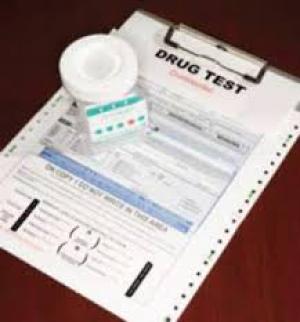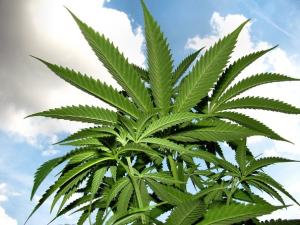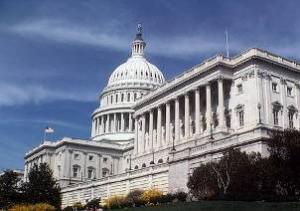From marijuana to psychedelics to the lingering overdose crisis to the emergence of a new vaping-related illness, a lot happened in 2019. Here are ten of the biggest highs and lows.
If we want to address the overdose crisis, we have to look beyond fentanyl and the opioids.
South Dakota is doing some really nasty things in the name of the war on drugs.
Is it time to legalize MDMA? The Beckley Foundation thinks so.
A Tennessee deputy goes on a bizarre crime spree, a California cop gets busted for the fondling the breasts of a dead overdose victim, and more.
Major League Baseball and its players' union have reached a drug testing agreement, Wisconsin's GOP Senate leader kills a medical marijuana bill, and more.
Italy legalizes hemp and CBD products, Trinidad and Tobago moves toward marijuana decrim, New Jersey legislaors are busy on two fronts, and more.
The latest version of California's psilocybin decriminalization initiative turns it into a legalization initiative, a group of Senate Republicans file a bill to treat drug cartels like terrorist organizations, and more.
Protections for state-level marijuana legalization programs gets stripped from a federal funding bill, two new polls have strong national support for legalization, a Dutch political party is pushing for the legalization of Ecstasy and soft drugs, and more.
It looks like Congress will once again block the District of Columbia from taxing and regulating legal marijuana sales, a key Rhode Island senator just says no to legalizing pot there next year, and more.
As the clock ticks down toward 2020, it's worth taking a moment to look back and reflect on what has gone on in the world of drug policy this year. From marijuana to psychedelics to the lingering overdose crisis to the emergence of a new vaping-related illness, a lot happened. Here are ten of the biggest highs and lows of 2019, in no particular order:

It was a big year for marijuana in Congress. Less so in the states.
In November, the House Judiciary Committee made history when it approved the Marijuana Opportunity Reinvestment and Expungement (MORE) Act (H.R. 3384). The bill would effectively legalize marijuana at the federal level by removing it from the Controlled Substance Act's drug schedules. It would also require federal courts to expunge prior convictions and conduct resentencing hearings for those still doing federal marijuana time. And it would assess a five percent tax on marijuana sales to create a fund to aid to people and communities most impacted by prohibition.
There's a good chance the MORE Act will get a House floor vote before the end of this Congress, but even if it does, its prospects in Sen. Mitch McConnell's Senate are dim at best. Still, step by step, Congress by Congress, the end of federal marijuana prohibition is drawing nearer.
2. Marijuana Banking Bill Passes the House
In September, the House passed the SAFE Banking Act, which would allow state-legal marijuana businesses to get access to banking and other financial services. The vote was 321-103, with near unanimous support from Democrats, as well as nearly half of Republicans.
The vote came although some civil rights and drug reform groups had called for it to be put off until more comprehensive marijuana or criminal justice reform, such as the MORE Act (see above) could be enacted. They argued that passage of a narrowly targeted financial services bill could erode momentum toward broader reforms. The MORE Act did win a House Judiciary Committee vote, but has yet to get a House floor vote.
And while SAFE passed the House, it must still get through the Senate, where it is not clear whether it will be allowed to a vote, much less whether it can pass. A companion version of SAFE, S.1200, was introduced in April by Sens. Jeff Merkley (D-OR), Cory Gardner (R-CO) and a bipartisan group of 21 original cosponsors. It currently has 33 total cosponsors. In September, Senate Banking Committee Chairman Mike Crapo (R-ID) said his committee would take up the cannabis banking issue this year and is working on preparing a new bill, but now it's December and little has happened.
3. Legalization in the States Didn't Have a Great Year
At the beginning of 2019, prospects looked good for as many as a half-dozen states to get legalization bills passed, but the year turned out to largely be a dud. Hopes were especially high in New Jersey and New York, where Democratic governors supported legalization, but it didn't come to pass this year in either state. In Albany, they'll be back at it next year, but in Trenton, it looks like the legislature is going to punt, opting instead to put the issue directly to the voters next year in a legislative referendum.
One state did make it all the way to the finish line: Illinois. After a legalization bill sailed through the legislature in the spring, Democratic Gov. J.B. Pritzker signed it into law in late June. With that signature, Illinois became the first state to create a system of taxed and regulated marijuana commerce through the legislative process, rather than through a voter initiative. (Vermont's legislature legalized possession and cultivation but not sales in early 2018.)
Getting bills through a state legislature is hard work, and it sometimes takes years. Still, that hard work that didn't quite make it over the top this year, is laying the groundwork for legalization in places like New Jersey and New York -- and maybe more -- next year. And next year is an election year, which means initiative campaigns that can bypass legislative logjams will be in play. There are already active campaigns in Arkansas, Florida, North Dakota and South Dakota, although none have yet qualified for the ballot. Look for 2020 to be a better year when it comes to freeing the weed.
4. Pot Prohibition Isn't Dead Yet: Despite Legalization, Marijuana Arrests Up in Latest FBI Crime Report
In late September, the FBI released its annual Uniform Crime Report for 2018, and once again, marijuana arrests were on the rise -- despite legalization in 11 states and DC, and decriminalization in 15 more states. There were some 663,367 marijuana arrests in 2018, up from 659,700 in 2017 and 653,249 in 2017. In all three years, simple possession cases accounted for about nine out of ten pot busts. Before 2016, marijuana arrests had been going down for more than a decade. Clearly, there is still work to do here.
5. US Supreme Court Unanimously Reins in Asset Forfeiture
In a February victory for proponents of civil libertarians, the US Supreme Court ruled in Timbs v. Indiana that the Eighth Amendment's Excessive Fines Clause applies to states, thereby prohibiting state and local governments from collecting excessive fines, fees and forfeitures. Justice Ruth Bader Ginsburg wrote the majority opinion. "The protection against excessive fines guards against abuses of government's punitive or criminal law-enforcement authority," Ginsburg wrote. The case involved the seizure of a $42,000 Land Rover over a drug sale of $225.
There was more progress on the asset forfeiture front on the state level, too: Bills to either end civil asset forfeiture entirely or to restrict it passed this year in Alabama, Arkansas, Michigan, and North Dakota, and in September, a South Carolina circuit court judge ruled civil asset forfeiture unconstitutional, setting up a fight in state appeals courts there.
6. Thousands of Federal Drug Prisoners Go Free Under First Step Act
President Trump signed the First Step Act into law at the end of last year, but the sentencing reform measure's true impact was felt in July, when the Bureau of Prisons released more than 3,000 prisoners and reduced the sentences of nearly 1,700 more. Almost all of those released were drug offenders. The First Step Act was aimed at redressing harsh sentences for federal prisoners excluded from the 2010 Fair Sentencing Act, which reduced -- but did not eliminate -- the infamous crack/powder cocaine sentencing disparity, but which did not include prisoners sentenced before its passage. Three states -- Florida, South Carolina and Virginia -- accounted for a whopping 25 percent of sentence reductions, and more than 90 percent went to African-American men.

A movement to decriminalize natural psychedelics emerged this year. (Greenoid/Flickr)
After emerging in 2018, the movement to decriminalize natural psychedelics mushroomed this year. In May, voters in Denver narrowly approved the Denver Psilocybin Mushroom Decriminalization Initiative, making clear that they wanted to "deprioritize, to the greatest extent possible, the imposition of criminal penalties on persons 21 years of age and older for the personal possession of psilocybin mushrooms." The measure also "prohibits the city and county of Denver from spending resources on imposing criminal penalties on persons 21 years of age and older for the personal use and possession of psilocybin mushrooms."
That surprise victory sparked interest across the country, and the following month Oakland followed suit, only this time it was the city council -- not the voters -- who decriminalized magic mushrooms and other natural psychedelics. In September, Chicago became the next city to get on board, with the city council unanimously passing an advisory resolution expressing support for research on the potential use of psychoactive plants and pledging support for adult use of the substances. Meanwhile, activists in three more major cities -- Berkeley, Dallas, and Portland -- were pushing psychedelic decriminalization measures, either through ballot initiatives or city council actions. By December, Decriminalize Nature, the group behind the movement, reported that more than 100 cities across the country are now seeing efforts to open up to psychedelics.
And it's not just cities. In two states, psychedelic reformers have filed initiatives aimed at the November 2020 ballot. In the Golden State, the California Psilocybin Mushroom Initiative, which would decriminalize the possession, use, and gifting of magic mushrooms and the chemical compounds -- psilocybin and psilocin -- has been cleared for signature gathering. It has until April 21 to come up with 623,212 valid voter signatures to qualify for the November 2020 ballot. Just across the border to the north, the Oregon Psilocybin Service Initiative, which would allow magic mushrooms to be grown with a license, and would allow for therapeutic use of psilocybin, is in the midst of signature gathering. It needs 112,020 valid voter signatures by July 2 to make the ballot. The Oregon measure in October got a nice $150,000 donation from Dr. Bronner's Magic Soaps.
8. Overdose Deaths Decline Slightly, But Are Still Way Too High
In July, the CDC reported 2018 drug overdose death numbers and found that they had declined from 2017's record high of more than 70,000 to just under 68,000, a five percent decrease. The latest data from CDC, which measured drug deaths in the 12-month period ending in April 2019 showed deaths at 67,000, suggesting that the decline continues, but at a glacial pace. Still, the number of overdose deaths is about seven times higher than it was in 1995, at the start of the prescription opioid epidemic.
The recent decline has been driven by a decrease in heroin and prescription opioid overdoses, although overdoses involving the synthetic opioid fentanyl increased, as did those involving the stimulant drugs cocaine and methamphetamine. Many overdoses involved more than one drug, with benzodiazepines often implicated.
If some researchers are right, fentanyl overdoses could balloon to an even higher level, if distribution of the highly potent substance takes hold in the western US. Most users take fentanyl unknowingly, after it's been used to cut street heroin or counterfeit pills.
9. Vaping-Linked Illness Emerges, Sparking Broad Anti-Vaping Backlash
In the summer, reports of vaping or e-cig users being struck down by a mysterious, lung-damaging condition began to emerge. By the end of October, the Centers for Disease Control and Prevention (CDC) reported more than 1,600 cases of lung-damaged vapors, with the death toll rising to 34. (That number has since risen to 47.) The CDC also gave the condition a name: e-cigarette or vaping product use associated lung injury (EVALI).
A likely culprit soon emerged: black market THC vaping cartridges contaminated with new additives, particularly thinners including propylene glycol (PG) and polyethylene glycol (PEG), vitamin E acetate, and medium chain triglycerides (MCT oil). The FDA has begun investigating vitamin E acetate, while public health officials in New York have found the substance in a majority of seized vape cartridges there. The FDA also announced in August that it is proposing adding propylene glycol as a "respiratory toxicant" in its list of harmful tobacco product ingredients.
While the CDC and the FDA responded to the outbreak with recommendations targeting the suspect products, elected and public health officials in a number of states responded by going after not black market marijuana vaping cartridges but legal flavored tobacco vaping products.
Massachusetts banned all vaping products, Michigan banned flavored nicotine products, New York banned flavored e-cigarettes, Oregon banned all flavored vaping products for six months, as did Rhode Island, while Washingtonissued a four-month ban on flavored vaping products. President Trump threatened to move toward a national ban on flavored vaping products, but has since changed course, even making an anti-prohibitionist argument to do so.
In its latest update, the CDC reports the number of EVALI cases has risen to nearly 2,300 and the death toll has climbed to 47. But unlike those state governments that reacted with flavored vaping bans, the CDC takes a different approach: It points the finger strongly at vitamin E acetate, recommends that people not use THC vaping products at this point -- especially if obtained informally or in the black market -- and also warns people not to add any products to vaping cartridges that are not intended by the manufacturer.
10. Safe Injection Sites Win an Important Preliminary Legal Battle
In a case involving a proposed safe injection site in Philadelphia, a federal judge ruled that it would not violate federal law. With the backing of city officials and former Gov. Ed Rendell (D), the nonprofit group Safehouse pressed forward with plans for the facility even though the Justice Department had warned that it would not allow any safe injection sites to move forward. The Justice Department sued in February to halt the project, arguing that it violated the federal "crack house law."
But US District Judge Gerald McHugh ruled that the "crack house" provision of the Controlled Substances Act does not apply to the group's bid to assist opioid users. "No credible argument can be made that facilities such as safe injection sites were within the contemplation of Congress" when that body wrote the law in 1986 or amended it in 2003, McHugh wrote. "I cannot conclude that Safehouse [the safe injection site] has, as a significant purpose, the objective of facilitating drug use. Safehouse plans to make a place available for the purposes of reducing the harm of drug use, administering medical care, encouraging drug treatment and connecting participants with social services."
While the Justice Department has appealed the ruling, it is a good omen, and the case is being carefully watched in cities such as Denver, New York, San Francisco, and Seattle, all of which are pursuing similar plans.
back to top
According to a report released last week by the Centers for Disease Control and Prevention (CDC) released last week, while fentanyl, heroin, and cocaine continue to account for most fatal drug overdoses in the Eastern US, it's a very different story once you cross the Mississippi River. Throughout the Western US, more people are dying from methamphetamines than those other three drugs.

crystal methamphetamine (Creative Commons)
The report, which examined the more than 70,000 drug overdose deaths in 2017, identified fentanyl as the deadliest drug nationwide, followed by heroin. Between them, the two opioids accounted for about 60 percent of all fatal overdoses. The third leading killer drug, cocaine, was involved in slightly more than 20 percent of overdoses. Meth came in fourth, accounting for 13.3 percent of overdoses nationwide.
Of the five geographic regions in the report east of the Mississippi, fentanyl was the leading killer, with heroin and cocaine alternating in second and third places. Meth never made it higher than fifth place among killer drugs in the East. It didn't even make the top 10 in Region 1 (New England) or Region 2 (New York and New Jersey), was in 7th place in Region 3 (the Mid-Atlantic states), and 5th place in Region 4 (the South) and Region 5 (the Midwest).
In the West, though, Region 7 (Iowa, Kansas, Missouri, Nebraska) was the only region where meth wasn't the leading cause of overdose deaths. There, it came in second behind fentanyl. But from Houston to Honolulu and San Diego to Sioux Falls, meth reigned supreme. In both Region 7 and Region 6 (Arkansas, Louisiana, New Mexico, Oklahoma, Texas), meth accounted for more than one-fifth of all overdose deaths, while in Region 8 (Northern Plains and Rockies), it accounted for more than a quarter of all ODs. In Region 9 (Arizona, California, Hawaii, Nevada) and Region 10 (Pacific Northwest and Alaska), meth was responsible for more than a third of all ODs.
Overall, the East has a significantly higher rate of drug overdose deaths. The age-adjusted death rate per 100,000 ranges from a low of 9.1 in the Southeast to a high of 22.5 in New England, while in the West, all regions except Region 7 had death rates of 1.7 or lower.
Clearly, many, many more drug users per capita are dying in the east, and the situation there, especially with fentanyl, requires and deserves serious attention. If some researchers are right, the western US is at risk of developing bigger fentanyl problems too, which could balloon opioid overdoses to even greater levels. Nevertheless, if anything is to be done about drug overdose deaths in the western US, dealing with methamphetamine is a key issue.
back to top
With endless miles of farmland shading into ever higher and drier terrain as one moves West, then on to the Badlands and then the Black Hills, South Dakota has a certain austere beauty. Not so in its approach to drugs. When it comes to drug policy, it is one of the ugliest places in the country.

South Dakota's Badlands. The state is a pretty bad land for drug users, too. (Creative Commons)
The staunchly conservative state holds the dubious distinction of being the only state to twice defeat a medical marijuana initiative (although activists are giving it another shot this year, and a more wishful legalization initiative, too). And it is being sued by the state ACLU over the
forced drug testing of toddlers and arrestees alike.
South Dakota also boasts the nation's only law making ingestion -- not possession -- of a controlled substance a felony, which helps explains the reflex resort to drug testing arrestees: A positive drug test becomes a prosecutable offense. While 10 other states have ingestion laws on the books, none of them make it a felony.
And now, a new report from the Prison Policy Initiative finds that South Dakota jails more people per capita than any other state, that almost half of all arrests are drug- or alcohol-related (compared to 29 percent nationally), and that people of color -- in this case, primarily Native Americans -- are disproportionately arrested at a rate far above the national average.
According to the report, South Dakota jailed 2,888 people per 100,000, nearly twice the national average of 1,506, and narrowly edging out Mississippi, which had 2,814 per 100,000. (Other states that jailed more than one out of 50 of their residents were Georgia, Kansas, Kentucky, New Mexico, Oklahoma, and Wisconsin.)
But jail is just the gateway to the incarceration complex, and when it comes to long-term stays behind bars, South Dakota displays the same sort of worrying numbers. According to the ACLU of South Dakota, the state's prison population has increased more than five-fold since the beginning of the drug war era 50 years ago. And despite 2013 reforms designed to reduce the prison population, it stubbornly stays near an all-time high reached in 2017.
In fact, new prison admissions spiked upward by 49 percent between 2015 and 2018. These numbers are largely attributable to drug prosecutions, with nearly one in three prisoners doing time for drugs in 2015, up from one in four the year before.
As the ACLU noted, "This increase was driven almost entirely by a rise in the number of people whose most serious offense was unauthorized ingestion of a controlled substance."
That's right -- South Dakota is spending millions of dollars to incarcerate people not for drug dealing, not for drug possession, but for having used drugs and still having traces of them in their system.
And it's doing so in a stunningly racially disproportionate manner. Native Americans make up only 7 percent of the state's population but constitute nearly one-third (31 percent) of the state prison population. Similarly, the state has a tiny African American population (2 percent), but black South Dakotans made up 8 percent of the prison population. The imprisonment rate for both African Americans and Native Americans was seven times that of the state's overwhelmingly white population. For the state's Latino population, the imprisonment rate was three times that of whites.
In a press release in October, the state ACLU reported that it's just as bad in the state's jails, with Native Americans making up roughly half of all jail admissions and accounting for the majority of all drug- and alcohol-related arrests in the state. The group noted that Native Americans between ages 15 and 64 are jailed at 10 times the rate of white people in South Dakota.
"It's time to come to terms with the significant racial disparities that are so ingrained in our criminal legal system," said said Libby Skarin, ACLU of South Dakota policy director. "This is not something that can be mitigated by solely reducing the number of arrests in South Dakota. Our elected officials need to acknowledge the realities of these racial disparities and commit to tackling them head-on."
State leaders grasp that there is a problem here. The state legislature has set up an interim study group to examine the state's approach to drug offenses, which met for the first time in August. The group includes legislators, law enforcement, court administrators, the South Dakota attorney general and the secretary of the Department of Corrections, but not public health officials or actual drug users.
The panel heard even more disturbing numbers about drug prosecutions. There were 2,104 people convicted of drug possession statewide last year, a more than five-fold increase from 2009, even though drug use levels have remained relatively stable over that period. That is leading panel members to wonder about the role of local prosecutors in generating such large increases in prosecutions.
"Though drug use is undoubtedly a serious issue, we can't incarcerate our way out of addiction," said the ACLU's Skarin, "The enormous amount of money South Dakota spends on jailing people for drug-related offenses is disproportionate and causes more harm than good to individuals struggling with addiction, their families and their communities."
That's why the ACLU is supporting initiatives such as reclassifying ingestion as a misdemeanor.
"Reclassifying ingestion as a misdemeanor and investing the resulting savings of state funds in diversion and treatment programs designed to combat addiction would go a long way in helping to solve the underlying problems leading to drug abuse," Skarin said.
Pennington County (Rapid City) public defender Eric Whitcher is on the same page as the state ACLU. He told the interim panel that 73 of his last 100 drug possession cases involved only trace amounts of not enough of the drug to be able to be weighed and that if such cases were not charged as felonies, his office could operate with significantly fewer felony prosecutors.
"We are an outlier," Whitcher said of South Dakota. "We are creating more felonies for the same conduct than our neighboring states. What impact does that have on their lives?"
Dropping ingestion from a felony to a misdemeanor would be a step in the right direction, but it's an awfully small step. South Dakota has a long, long way to go to get on the right side of drug policy, and no natural beauty can hide that.
back to top
Every weekend, hundreds of thousands of young club- and concert-goers buy and consume black market pills and powders they hope are MDMA, the methamphetamine relative with a psychedelic tinge known on the streets as Ecstasy or Molly. A tiny percentage of them -- a few dozen each year in the United States or Britain -- die. It doesn't have to be that way.

Ecstasy pills (Erowid.org)
Granted, those numbers are miniscule when compared with the tens of thousands who die each year in the US using opioids, benzos, and stimulants like cocaine and meth, much less from the legal substances alcohol and tobacco. But that relative handful of deaths could almost certainly be eliminated by bringing Ecstasy in from the cold -- making it legal and regulated instead of subjecting its users to black market Russian roulette.
And now somebody has a plan for that. The British Beckley Foundation, which has been advocating for research into psychoactive substance and evidence-based drug policy reform for the past two decades, has just released a new report, Roadmaps to Regulation: MDMA, that takes a good, hard look at the drug and charts a path to a saner, less harmful way of handling Ecstasy than just prohibiting it, which, the report notes, "has never meaningfully disrupted its supply, nor its widespread use."
That's because, despite it being illegal, for many, many people, Ecstasy is fun. And the Beckley report does something rare in the annals of drug policy wonkery: it acknowledges that. "Hundreds of thousands of people break the law to access its effects, which include increased energy, euphoria, and enhanced sociability," the report says.
The authors concede that Ecstasy is not a harmless substance, and take a detailed dive into acute, sub-acute, and chronic harms related to its use. They point to overheating (hyperthermia) and excess water intake (hypnoatraemia) as the cause of most Ecstasy deaths, and they examine the debate over neurotoxicity associated with the drug, very carefully pointing out that "there is evidence to suggest that heavy use of MDMA may contribute to temporary impairments in neuropsychological functions."
But they also point out that most of the problems with Ecstasy are artifacts of prohibition: "Our evidence shows that many harms associated with MDMA use arise from its unregulated status as an illegal drug, and that any risks inherent to MDMA could be more effectively mitigated within a legally regulated market," they write.
The most serious harmful effect of treating Ecstasy use and sales as a criminal matter is that users are forced into an unregulated, no-quality-control black market and they don't know what they're getting. Tablets have been found with as little as 20 milligrams of MDMA and as much as 300 milligrams. And much of what is sold as MDMA is actually adulterated with other substance, including some much more lethal ones, such as PMA (paramethoxyamphetamine) and PMMA (paramethoxymethamphetamine). This is how people die. As the authors note:
"The variability in MDMA potency and purity is a direct result of global and national prohibitionist policies. Recent developments around in situ drug safety testing are an attempt to mitigate the risks of such variability. These risks, such as overdose and/or poisoning, are by no means inevitable or inherent to the drug. If MDMA were clinically produced and legally distributed, users would be assured of the product content and appropriate dosage and be able to make more informed decisions regarding their MDMA use. In this way the principal risks we associate with MDMA use would be greatly reduced."
But the report also addresses a whole litany of other prohibition-related harms around Ecstasy that exacerbate the risks of its use. From making users less likely to seek medical help for fear of prosecution to making venues adopt "zero tolerance" policies that actually increase risks (such as drug dog searches that encourage users to take all their drugs at once before entering the venue) to the rejection of pill testing and other harm reduction measures, prohibition just makes matters worse.
In addition to harms exacerbated by prohibition, there are harms created by prohibition. These include "a lucrative illegal MDMA market that generates wealth for entrenched criminal organizations," the saddling of young users with criminal records, the risk that people who share or sell drugs among their friends could be charged as drug dealers, and the development of black markets for new psychoactive substances (NSPs), many of which are more dangerous than Ecstasy. Also not to be forgotten is the loss of decades of research opportunities into the therapeutic use of MDMA, research that was showing tremendous potential before the drug was prohibited in the mid-1980s.
Prohibition of Ecstasy is not only not working but is making matters worse. So what should we do instead? Beckley is very clear in its conclusions and recommendations. First, these preliminary steps:
- Reschedule MDMA from Schedule I to Schedule II of the Controlled Substances Act (the Misuse of Drugs Regulations in Britain) in order to reduce barriers to research and to improve our understanding of its physiological effects.
- "Decriminalize the possession of MDMA and all drugs to remove the devastating social and economic effects of being criminalized for drug possession or limited social supply."
- Use decriminalization to comprehensively roll out drug safety testing (pill testing) and other proven harm reduction measures.
Once those preliminary steps are done, it's time to break big:
- Award licenses to selected pharmaceutical manufacturers to produce MDMA under strict manufacturing requirements.
- Allow licensed MDMA products to be sold at government licensed MDMA outlets. The report suggests pharmacies in the first instance.
- For harm reduction purposes, retail outlet staff would need to be specially trained to educate users on the risks associated with MDMA.
- Users who wish to purchase licensed MDMA products would be required to obtain a "personal license" to do so. Such a license would be granted after an interview with trained sales staff demonstrates that the would-be user understands the risks and how to reduce them.
- Develop adults-only MDMA-friendly spaces where the risks associated with the drug can be combatted with the full panoply of harm reduction measures.
- "User controls" to encourage responsible MDMA use. These would include "a strictly enforced age limit, pricing controls, mandated health information on packaging and at point of sale, childproof and tamperproof packaging, a comprehensive ban on marketing and advertising, and a campaign to minimize the social acceptability of driving under the influence of MDMA and to promote alternatives such as designated drivers."
- "Sales of MDMA would be permitted to adults over 18 years of age. Prohibitive penalties would be in place to restrict underage sales."
- Education campaigns focusing on MDMA safety and responsible use that would cover sales outlets and schools and universities. Such campaigns would include information about how to recognize and manage adverse events related to MDMA products.
- Monitor and evaluate the impact of these changes to continue an evidence-based approach and allow feedback into policymaking.
There you have it, a step-by-step plan to break with prohibitionist orthodoxy and create a legal, regulated market for a popular recreational drug. Whether you or I agree with every plank of the plan, it is indeed a roadmap to reform. The evidence is there, a plan is there; now all we need is the political pressure to make it happen somewhere. It could be the United Kingdom, it could be the United States, it could be the Netherlands, but once somebody gets it done, the dam will begin to burst.
back to top
A Tennessee deputy goes on a bizarre crime spree, a California cop gets busted for the fondling the breasts of a dead overdose victim, and more. Let's get to it:
In Chattanooga, Tennessee,
a Hamilton County sheriff's deputy was arrested last Tuesday on 44 criminal charges, including 25 felonies, for actions he took in the course of official duties. Deputy Daniel Wilkey faces charges of rape, extortion, stalking and assault. In one case, he found a woman in possession of a small amount of marijuana. He offered not to arrest her if she would would allow him to baptize her in his underwear. The woman said she felt she had no choice but to agree, so she went with him into the lake, where he stripped to his underwear and submerged her in the lake with his hands on her back and her breasts. He is charged with stalking, assault, extortion, and false imprisonment in that case. In another case, he faces felony rape and misdemeanor assault charges for performing a body cavity search on a black motorist he pulled over.
In Los Angeles, an LAPD officer was arrested last Thursday for allegedly fondling the breasts of a woman who had died of a drug overdose. Officer David Rojas, 27, allegedly "touched the woman's breast" when alone with the body while on the October 20 call. He was arrested by LAPD's Internal Affairs Division after it reviewed his body camera footage. He is charged with one felony count of having sexual contact with human remains.
In Little Rock, Arkansas, a state prison guard was arrested Monday on charges he smuggled marijuana into the prison. Jordan Davis, 22, was charged with one felony count of furnishing, possession or delivering prohibited articles. He got caught trying to smuggle 12 grams of marijuana and 17 grams of tobacco that were wrapped in plastic and hidden inside his pants.
In New York City, a former NYPD sergeant pleaded guilty November 27 to running drugs for the notorious Nine Trey Blood gang. Ex-cop Arlicia Robinson admitted transporting more than 100 grams of heroin from the Bronx to Manhattan last July. Robinson was indicted in November 2018 on three narcotics counts. It's not clear from the reporting which one she copped to.
back to top
Major League Baseball and its players' union have reached a drug testing agreement, Wisconsin's GOP Senate leader kills a medical marijuana bill, and more.

Major League Baseball players will no longer be tested for marijuana, but now will be tested for opioids. (Creative Commons)
Kansas Residents Want Marijuana Legalization, Poll Finds. The annual Kansas Speaks survey, conducted by Fort Hayes State University, finds that 63% of respondents either "strongly support" or "somewhat support" legalizing and taxing marijuana for adult use. Only 26% "somewhat oppose" or "strongly oppose" it. The state doesn't even have legal medical marijuana yet.
Medical Marijuana
Wisconsin GOP Senate Leader Snuffs Out GOP Medical Marijuana Bill. Republicans Rep. Mary Felzowski and Sen. Kathy Bernier tried Wednesday to get a medical marijuana bill moving, only to be shot down by Senate Majority Leader Scott Fitzgerald. Fitzgerald once again rejected the bill, saying he personally opposed and that he didn't think it would pass the GOP-controlled Senate.
Drug Testing
Major League Baseball, Players Union Agree on Drug Testing Policy. Major League Baseball and the players' union have agreed on a new drug testing policy that will add opioid testing for major leaguers and will not punish either minor or major league players for marijuana use. The move comes five months after the death of Los Angeles Angels pitcher Tyler Skaggs from an opioid overdose.
International
US Charges Former Mexican Top Cop with Taking Sinaloa Cartel Bribes. The US has charged former Mexican federal police overseer Genaro Garcia Luna with taking millions of dollars in bribes from Joaquin "El Chapo" Guzman's Sinaloa Cartel. He was arrested Monday in Texas after being indicted last week by a federal grand jury in Brooklyn on three counts of cocaine trafficking conspiracy and one count of making false statements for helping the cartel operate "with impunity" in Mexico. Garcia Luna served as Mexico's secretary of public security from 2006 to 2012 and has been living in the United States since 2012. If convicted, he faces a minimum of 10 years in prison and the maximum of a life sentence.
back to top
Italy legalizes hemp and CBD products, Trinidad and Tobago moves toward marijuana decrim, New Jersey legislators are busy on two fronts, and more.

New Jersey legislators are making progress on two different fronts this week. (Creative Commons)
Senators Demand Update from DEA On Marijuana Growing Applications. A group of Democratic senators led by Sen. Elizabeth Warren (D-MA) have sent a letter to the DEA, the Office of National Drug Control Policy (ONDCP -- the drug czar's office), and the Department of Health and Human Services (HHS) demanding that they provide an update on efforts to expand the number of authorized marijuana grows for research purposes. The letter notes that DEA announced more than three years ago that it would begin approving additional research grows, but has yet to issue any new licenses. The agency says the volume of new applications requires that it develop alternate rules before issuing any new licenses.
Massachusetts Pot Shops Okayed to Resume Sales of Some Vaping Products. The state's Cannabis Control Commission has amended a November ban on marijuana vaping products, now allowing stores to sell them but only if they are manufactured after this date and have been tested for contaminants.
New Jersey Legislature Holds Hearing on Marijuana Referendum. Legalization supporters outnumbered foes Thursday as the legislature held hearings in both chambers on whether to put a constitutional amendment on the November 2020 ballot letting voters decide on whether to free the weed. Votes on the measure are expected in both houses on Monday.
Expungement
New Jersey Drug Expungement Bill Headed for Monday Vote. After an Assembly committee passed a bill, A-5981, Thursday without hearing any testimony, the measure heads for floor votes in both houses on Monday. The bill would make it easier for people to rid their records of minor drug and other offenses. Under its "clean slate" provision, all prior non-serious crimes could be sealed after a decade, while those involving smalltime marijuana or hashish possession could be expunged immediately. For minor drug offenses that occur after the bill is passed, a judge would immediately remove them from a person's record.
Foreign Policy
Senate Committee Passes Resolution for Sanctions Against Philippine Officials Involved in Imprisonment of Drug War Critic Sen. Leila de Lima. The Senate Foreign Relations Committee on Tuesday unanimously approved the Free Leila resolution (Senate Resolution 142), which calls for the applications of sanctions under the Magnitsky Act against Philippines officials responsible for "orchestrating the arrest and prolonged detention" of Filipina drug war critic Sen. Leila de Lima. The resolution also calls for sanctions against members of the security forces and Philippine officials responsible for extrajudicial killings during President Rodrigo Duterte's bloody drug war. The resolution is non-binding but signals strong revulsion toward the behavior of the Duterte government.
Law Enforcement
Detroit Narcs Accused of Corrupt Policing. A raid on the Detroit Police Department's narcotics unit in August has uncovered dirty dealing there. Investigators have found a half-dozen instances of narcs stealing money from alleged drug dealers and two where drugs were planted on suspects. One former narc was arrested the day of the raid on federal charges he took bribes from a drug dealer, and Chief James Craig said he's looking at the unit that the officer was assigned to. "Sadly, as we continue our probe, we think it's going to grow in terms of magnitude," Craig said.
International
Italy Legalizes Hemp, CBD Products. Parliament this week legalized the production and sale of cannabis products containing less than 0.5% THC. The law will go into effect January 1. Former rightist Interior Minister Matteo Salvini had vowed to shut down shops selling what the Italians call "cannabis light," but now parliament has thwarted that effort.
Trinidad and Tobago Lawmakers Approve Marijuana Decriminalization Bill. The House of Representatives on Wednesday approved a bill that would decriminalize the possession of up to 30 grams of marijuana. People caught with more than 30 but less than 60 grams would pay a fixed fine. The bill would also allow for the personal cultivation of up to four plants and provide a pathway for expungement of previous small-time marijuana offenses. The bill now heads for a Senate vote later this month. But it also contains provisions that would impose new penalties against possession and distribution of other substances, such as LSD, MDMA and ketamine.
back to top
The latest version of California's psilocbyin decriminalization initiative turns it into a legalization initiative, a group of Senate Republicans file a bill to treat drug cartels like terrorist organizations, and more.

Under the latest language in California's magic mushroom initiative, you could buy them at a store. (CC)
California Psilocybin Decriminalization Initiative Now a Legalization Initiative. The latest version of the California Psilocybin Decriminalization initiative includes language that would legalize the production and sale of magic mushrooms, as well as decriminalizing their possession and use. "The personal, spiritual, religious, dietary, therapeutic, and medical use of Psilocybin Mushrooms by adults, including but not limited to the cultivation, manufacture, processing, production of edible products and extracts (with or without solvents) derived from Psilocybin Mushrooms, distribution, transportation, possession, storage, consumption, social consumption, on-site consumption, public events, farmers' markets, and retail sale, whether or not for profit, shall be lawful in this state and is a matter of statewide concern," the initiative now says.
Asset Forfeiture
Indiana Police Used $400K In Asset Forfeiture Funds to Boost Their Own Pay and Benefits, Audit Finds. A federal audit of Indiana law enforcement's use of federal asset forfeiture funds has found that police unlawfully used nearly $400,000 of those monies to increase their own pay and benefits. The federal "equitable sharing program" that distributes the funds does not allow police to use those monies for such expenses.
Kansas Lawmakers Punt on Asset Forfeiture Reform, Seek Review Instead of Passing Legislation. After an audit this past summer criticized law enforcement for taking advantage of vague asset forfeiture laws, lawmakers debated whether to enact legislation to remedy the situation. Now, they've decided not to act this year, but to instead ask a judicial advisory group to review any potential changes. The House Judiciary Committee heard testimony last month on several measures, including one to require a conviction before property is seized, but opted to send the bills to the Kansas Judicial Council, an advisory committee in the judicial branch. Chairman Blaine Finch said the council would be able to study the bills more extensively than the Legislature would.
Foreign Policy
Senate Republicans File Bill to Impose Sanctions on Drug Cartels. Led by Sen. Tom Cotton (R-AR), a group of nine Republican senators last week filed the Significant Transnational Criminal Organization Designation Act, legislation that would subject certain foreign criminal organizations like drug cartels to sanctions, including immigration, financial and criminal penalties. The process would be similar to the system used for designating entities as Foreign Terrorist Organizations (FTOs). Passage of the bill would allow the federal government to impose on the most significant Transnational Criminal Organizations (TCOs) the same sanctions that apply to FTOs.
International
Thai Justice Minister to Speed Up Kratom Decriminalization. Justice Minister Somsak Thepsutin says he will speed up the decriminalization of kratom. He said the Justice Ministry has formed a committee to study kratom-based medicines. "I will proceed with this project as soon as possible because legalization will truly benefit society," he said. Although kratom is not considered a scheduled drug by UN treaties, it has been illegal in Thailand since 1943, with possession punishable by up to a year in jail.
Zambia Legalizes Marijuana Production, But for Export and Medical Purposes Only. The government has approved a proposal to legalize marijuana production, but it will be restricted to exports and medical purposes. The government wants a $250,000 annual license fee from companies wishing to get into the business. Approval came last Wednesday during a cabinet meeting.
back to top
Protections for state-level marijuana legalization programs gets stripped from a federal funding bill, two new polls have strong national support for legalization, a Dutch political party is pushing for the legalization of Ecstasy and soft drugs, and more.

As the year comes to an end, there's a lot of action on the state-level marijuana legalization front. (Creative Commons)
Majority of Americans Support Marijuana Legalization, Two More Polls Show. Two new polls show solid majorities for marijuana legalization. A Fox News poll has 63% supporting legalizing "the recreational use of marijuana at the national level," while a Marist/NPR/PBS poll had 62% saying legalizing marijuana is "a good idea." That's in line with most polls in recent years.
House-Passed Marijuana Amendments Stripped from Congressional Spending Bills. A number of marijuana-related provisions, including one that would have provided protection for tribal and state-legal recreational marijuana, have been stripped from large-scale spending legislation after negotiations with the Senate. Negotiators did agree to keep a long-running rider that protects state-level medical marijuana programs.
Kentucky Marijuana Legalization Bill Filed. State Rep. Cluster Howard (D-Jackson) has pre-filed a bill to legalize marijuana and use tax revenues to fund the state's retirement system. All license and wholesale tax revenues would go either to the Kentucky Employees Retirement System (75%) or the Kentucky Teachers Retirement System (25%). The bill would legalize the possession of up to an ounce by adults and set up a system of state-regulated cultivation, processing, testing, and sales.
Florida Marijuana Legalization Initiative Falls Short on Signatures. The Regulate Florida campaign to put a marijuana legalization initiative on the 2020 ballot has fallen short. On Monday, the campaign conceded that it would not make a January 1 deadline for handing in signatures. A second legalization initiative, sponsored by Make It Legal Florida, is still alive.
New Jersey Legislature Approves 2020 Marijuana Legalization Referendum. Large majorities of lawmakers on Monday approved a proposed ballot question on whether to legalize marijuana. That means voters will decide the issue in November 2020. They also approved a bill to expunge records for low-level drug offenses.
North Dakota Marijuana Legalization Initiative Approved for Signature Gathering. Secretary of State Al Jaeger (R) on Monday approved the Legalize ND marijuana legalization initiative for signature gathering. Now, the group needs 13,500 valid voter signatures by July 6 to get the measure on the 2020 ballot. It would allow any person over the age of 21 to use, possess, and transport up to two ounces of prepared marijuana, but it would ban home growing of the plant.
Oklahoma Marijuana Legalization Initiative Filed. Sooner State activists have filed a marijuana legalization initiative, State Question 806, that would legalize the personal possession and cultivation of marijuana, as well as set up a system of state-regulated and -taxed sales. Organizers have until September 4 to come up with 178,000 valid voter signatures to qualify for the 2020 ballot.
International
Dutch Coalition Party to Push for Legalizing Ecstasy, Soft Drugs The D66 Party, a member of the governing coalition, is moving to legalize soft drugs and Ecstasy in a bid to reduce drug crime and health harms. The party is asking Dutch celebrities to support a national manifesto on which it is working. Current drug policy is failing and "no longer tenable", according to the D66. "We have to face the reality: people use drugs in the Netherlands. It is important that we not label these people as criminals, but focus on providing information," the party said. "In the manifesto we opt for a regulated drug market, such as regulation of ecstasy. Only in this way can we minimize health risks and tackle drug crime."
back to top
It looks like Congress will once again block the District of Columbia from taxing and regulating legal marijuana sales, a key Rhode Island senator just says no to legalizing pot there next year, and more.

Congress still blocking DC from full legalization
Indiana Marijuana Decriminalization Bill Filed. State Sen. Karen Tallian (D-Ogden Dunes) filed a marijuana decriminalization bill Monday. She said it was appropriate because neighboring Illinois and Michigan have already legalized marijuana. Her bill would make possession of less than 1 ounce of marijuana a ticketable infraction with a small fine and no jail time; instead of a misdemeanor crime with penalties of up to six months in jail and a $1,000 fine for a first offense. The bill is not yet available on the legislative web site. The ten-week Indiana legislative session begins January 6.
Rhode Island Senate Leader Says No Marijuana Legalization Next Year. Senate President Dominic Ruggiero (D) said Tuesday there would be no marijuana legalization bill passed in the legislature next year. "No," he said when asked whether 2020 would be the year it happens. "I want to see what is happening in Massachusetts. I am not crazy about the medical marijuana program in this state. I don't think people have a handle on it... If we can't handle medical marijuana, there is no way we can enforce the laws for legalization." Gov. Gina Raimondo (D) has said she plans to propose legalization in her upcoming state budget -- as she did last year, only to see the proposal die in the General Assembly.
Washington, DC, Likely Won't Get Legal Marijuana Sales Next Year. On Monday, House Democrats unveiled their 2020 appropriations bill for the District of Columbia, and the bill continues the ban on DC creating a regulated and taxed market for legal marijuana. Mayor Muriel Bowser (D) criticized the bill and said the District should have the same right to implement marijuana legalization as anywhere else in the country: "Well it's just another reason why we have to march towards statehood," she said. "Until we are autonomous and a state just like everyone else in America, we can always have this interference from Congress!"
back to top









